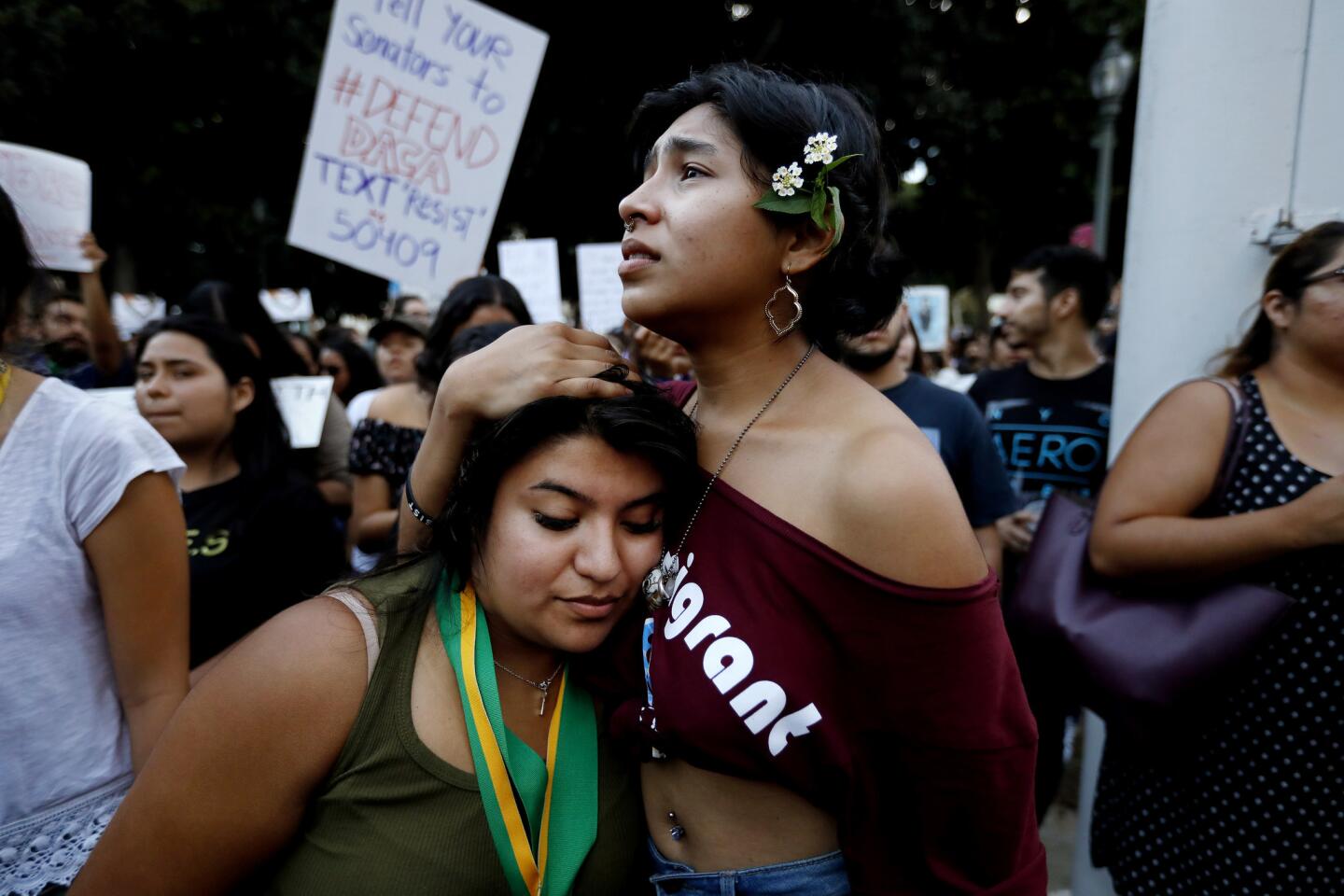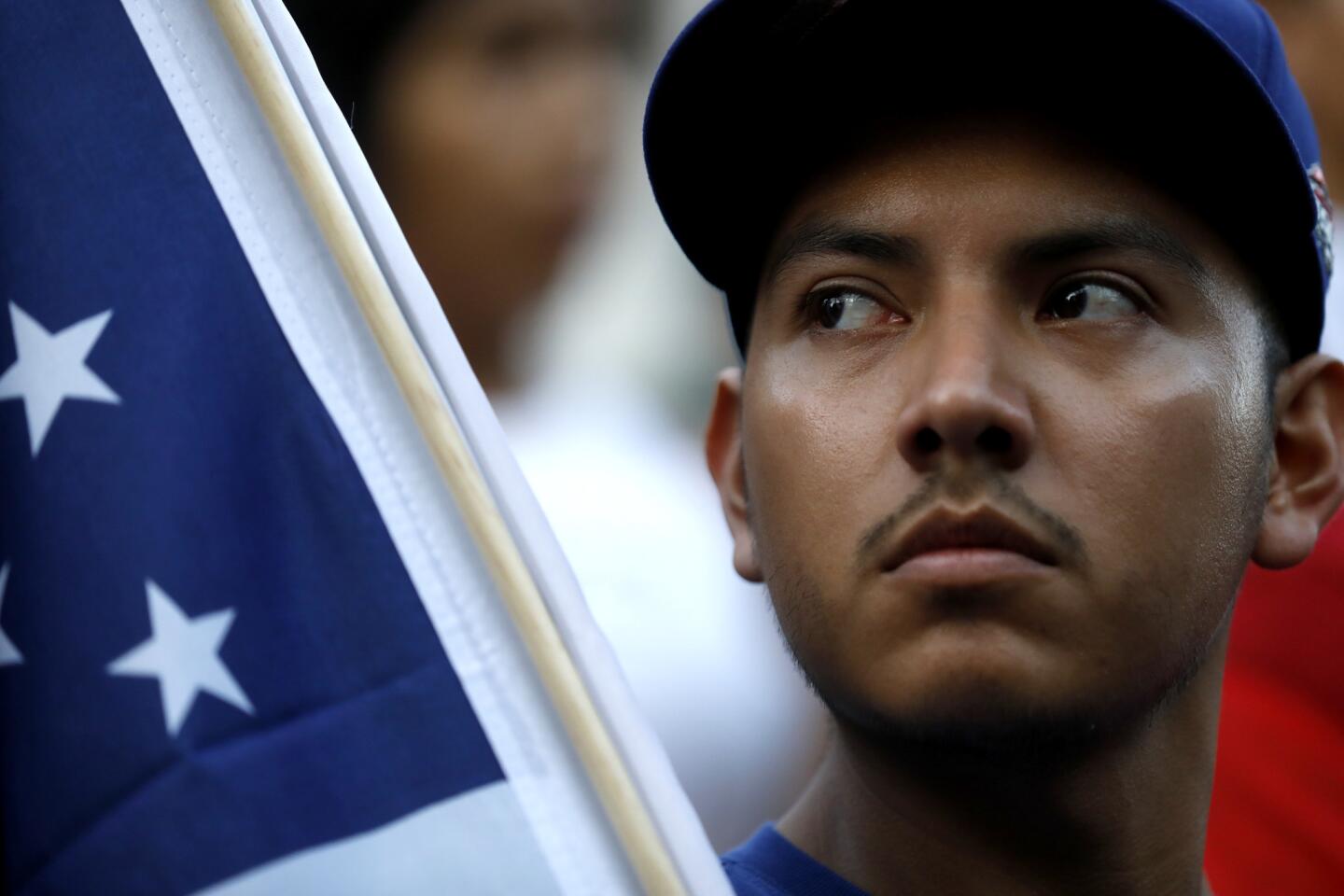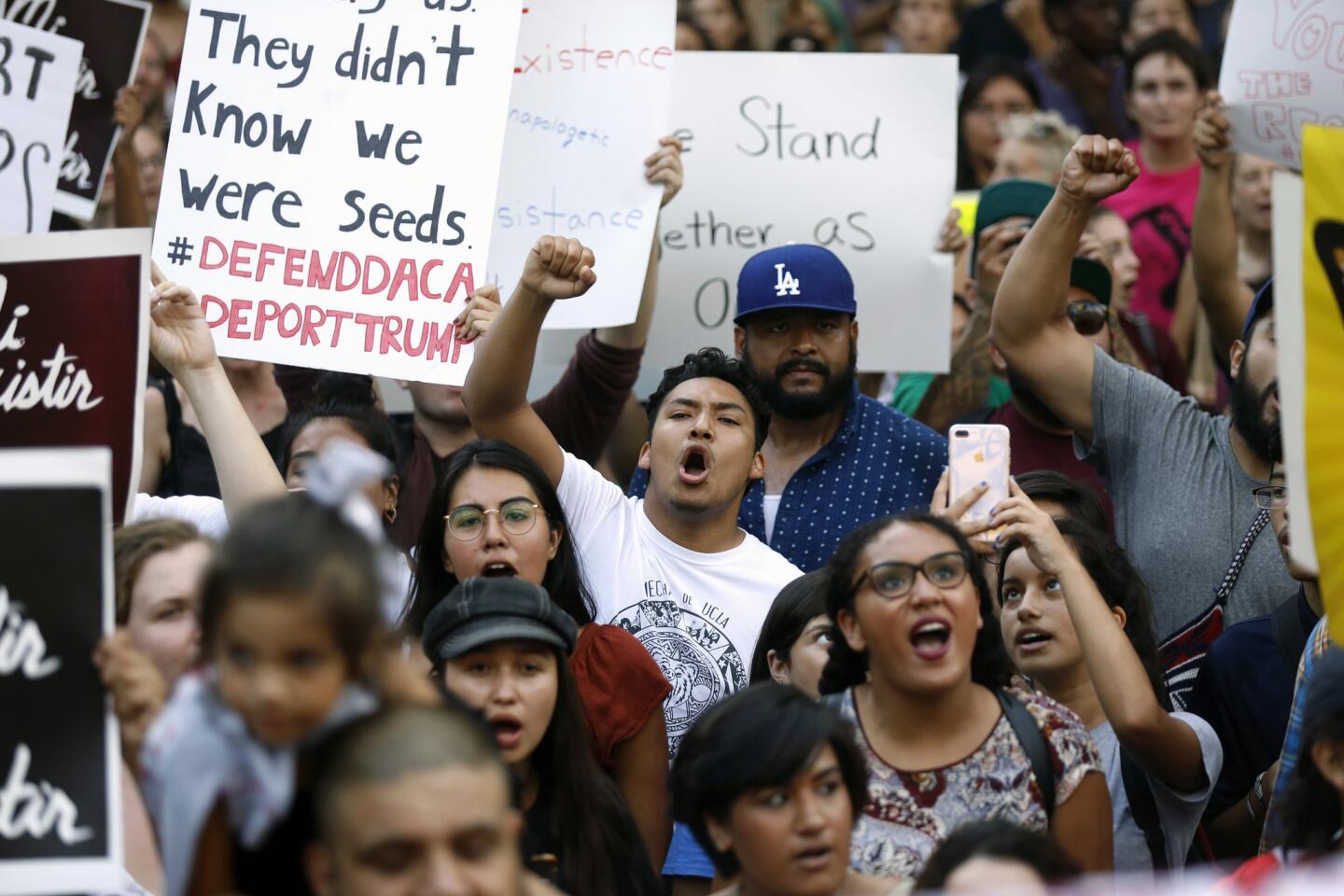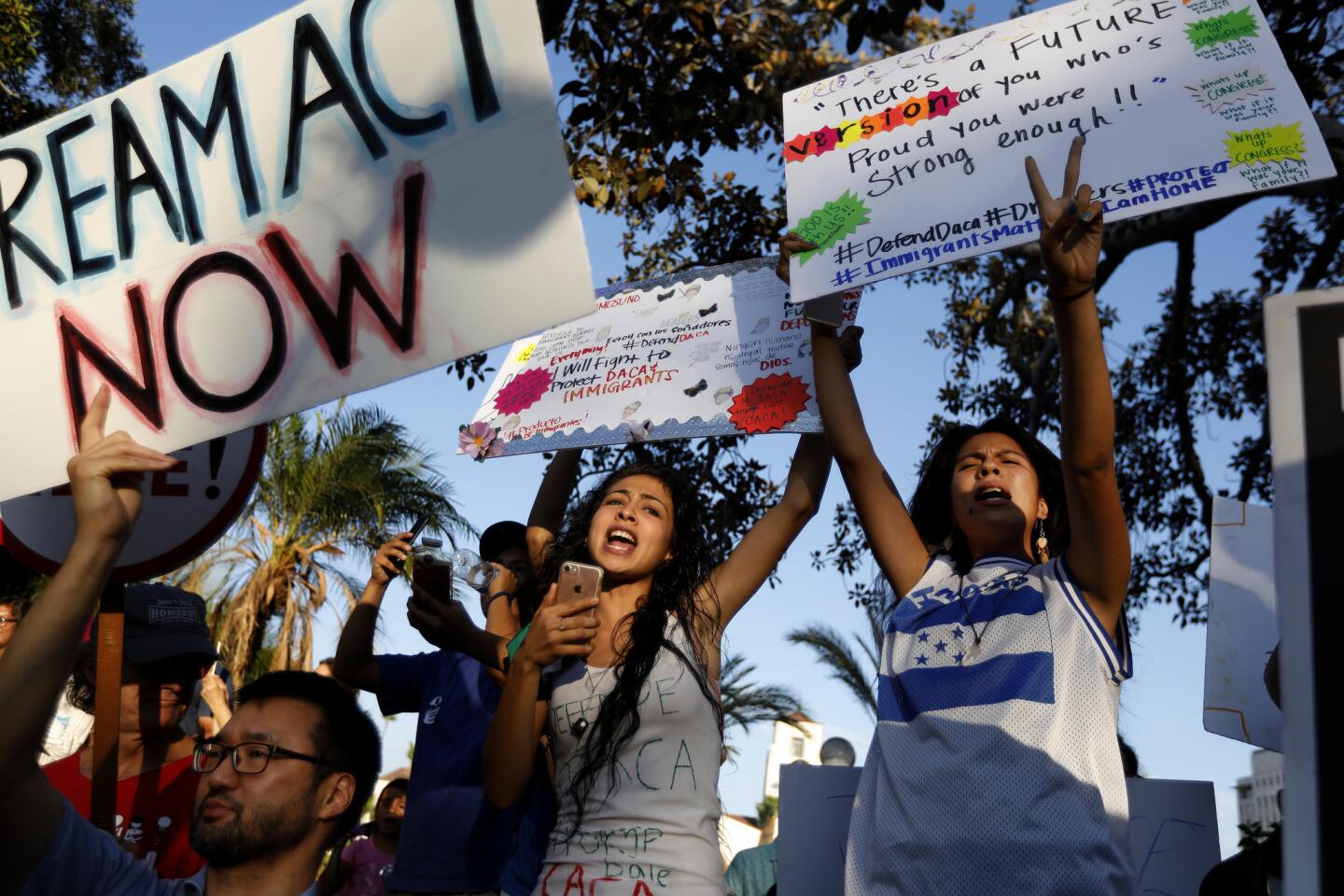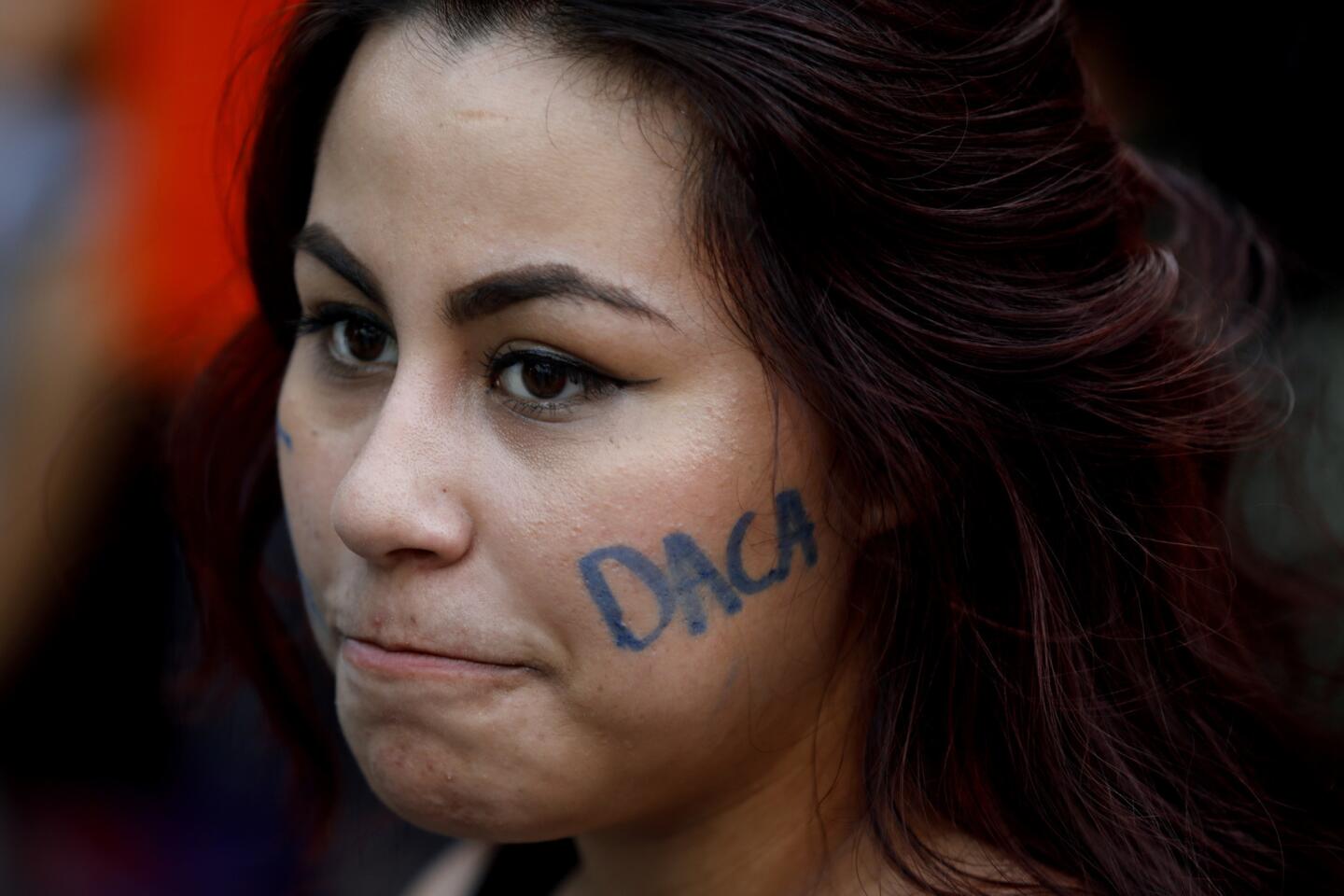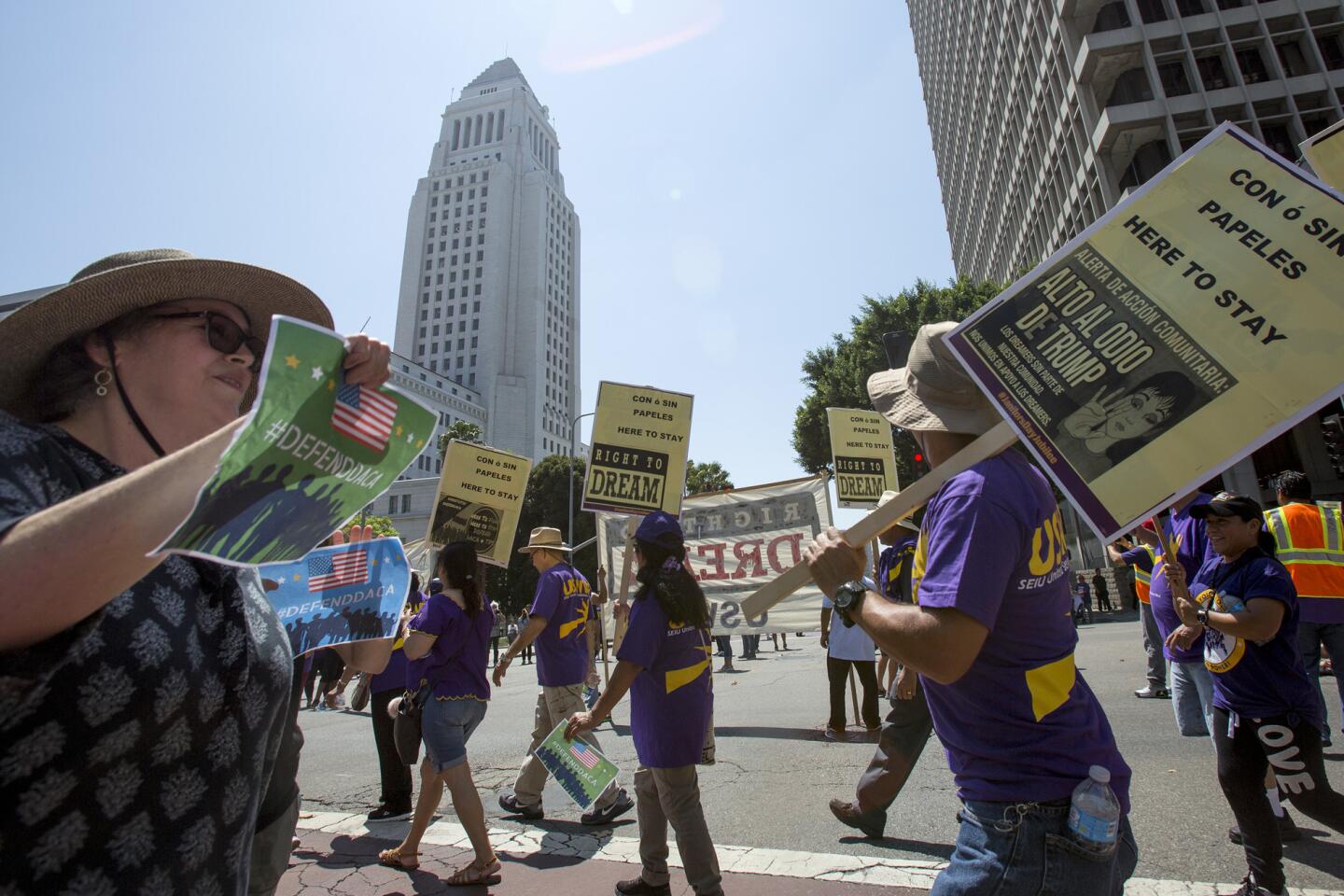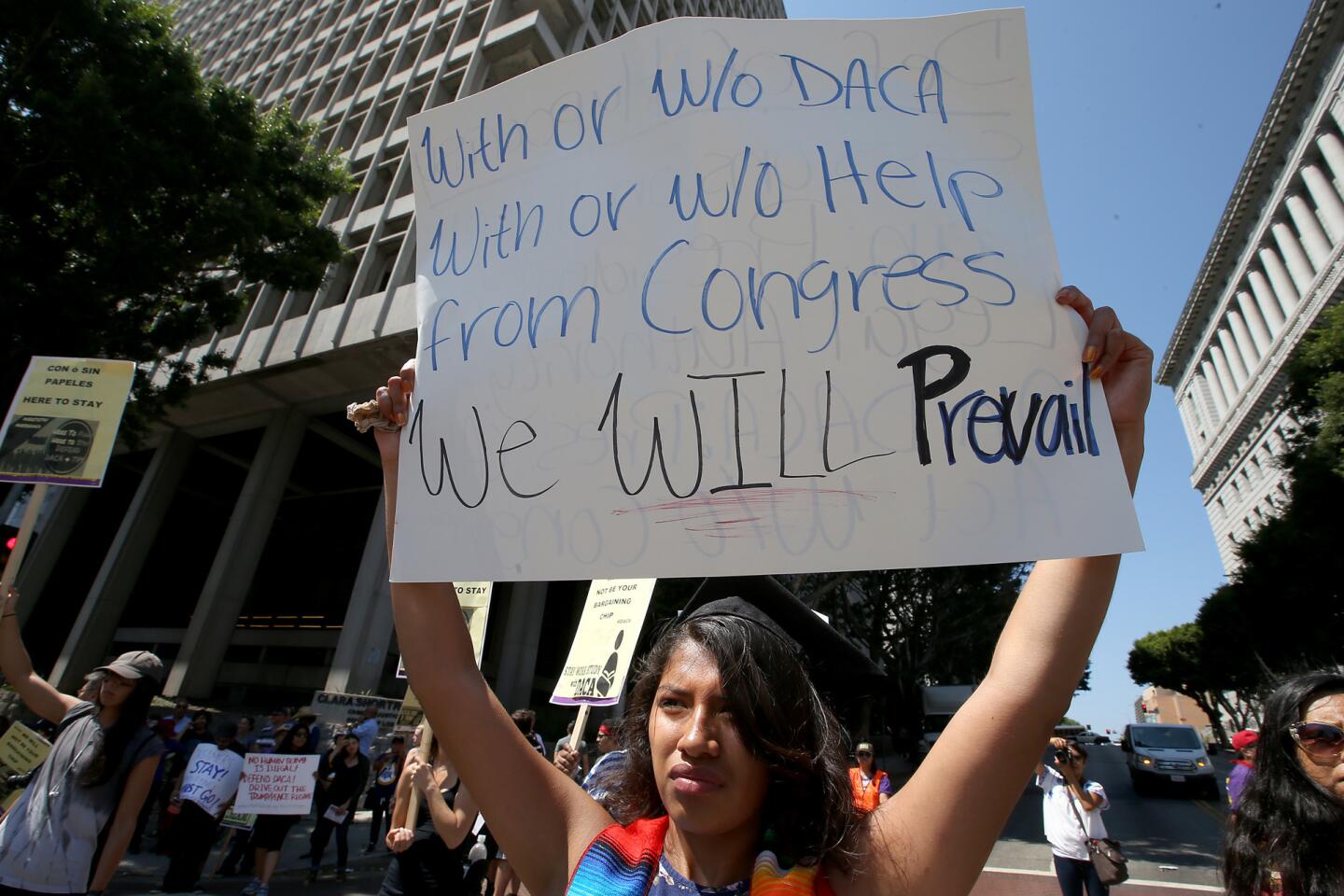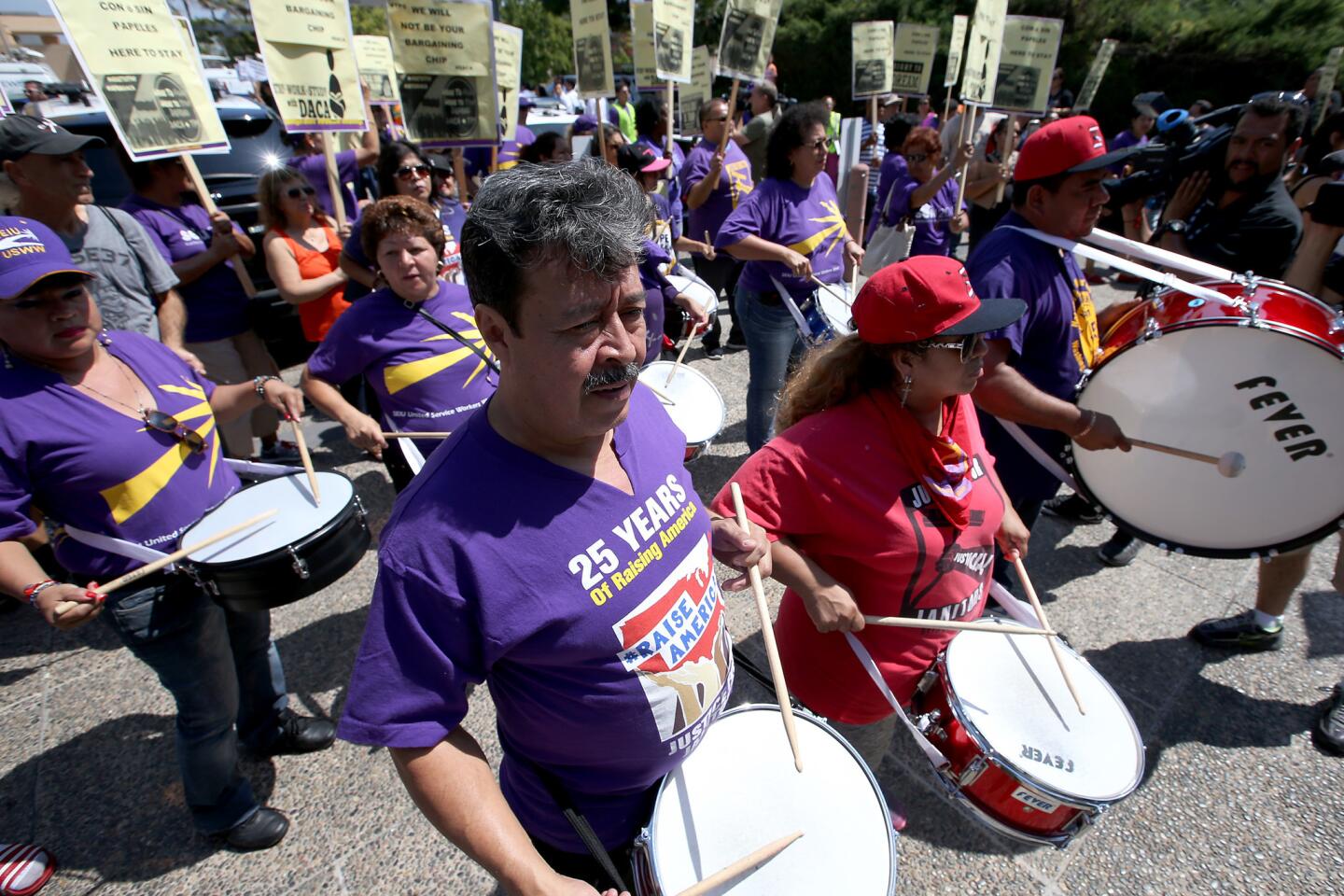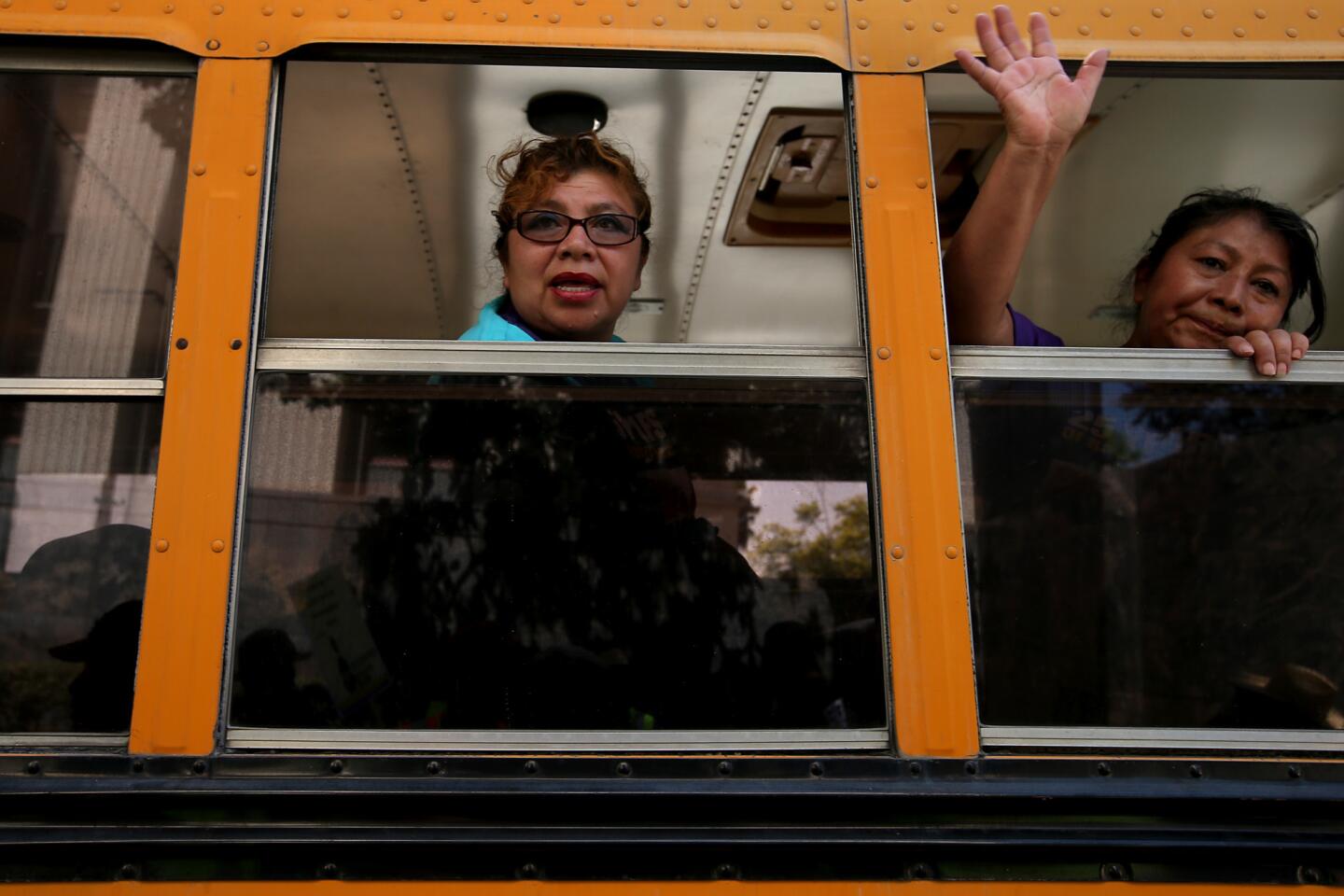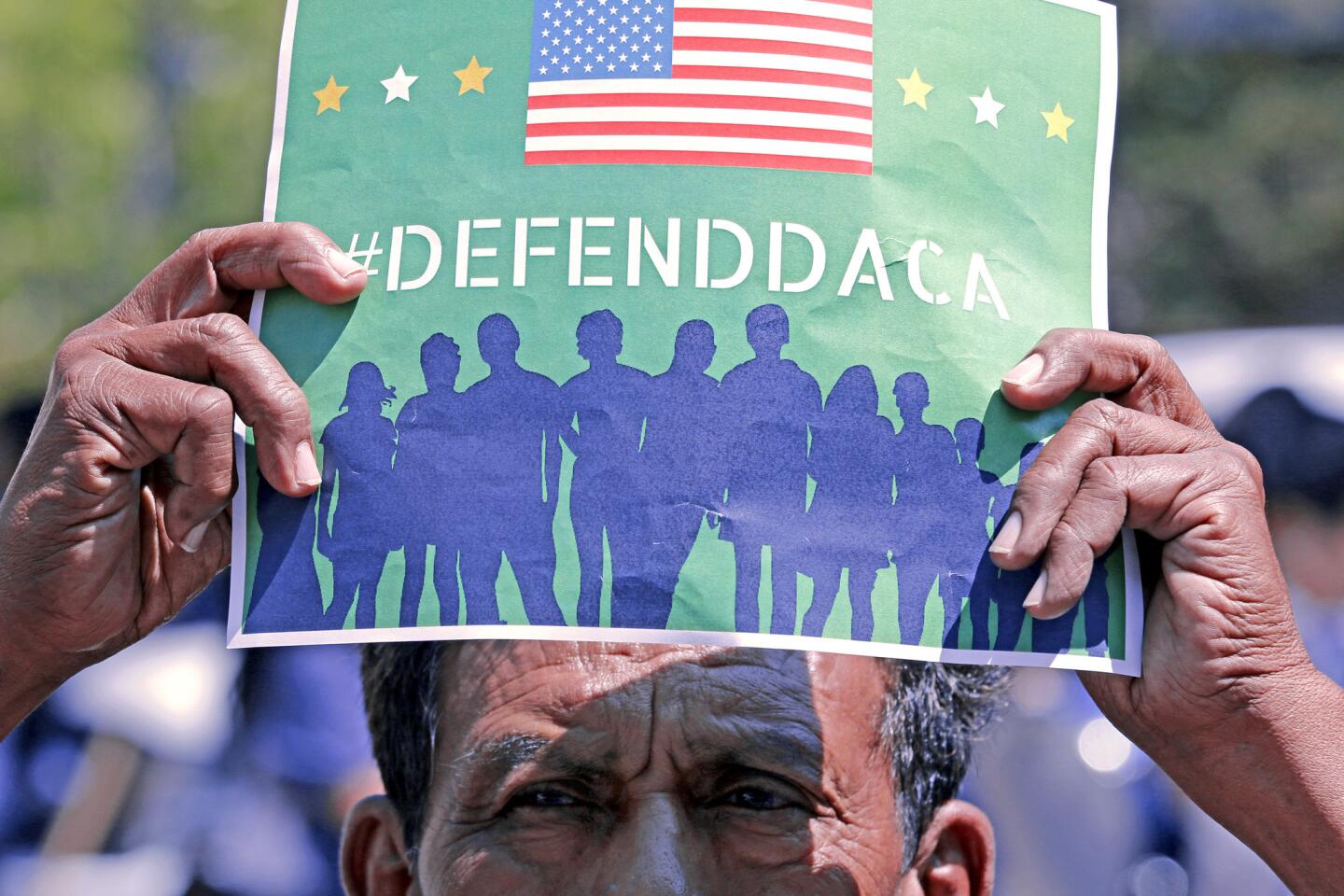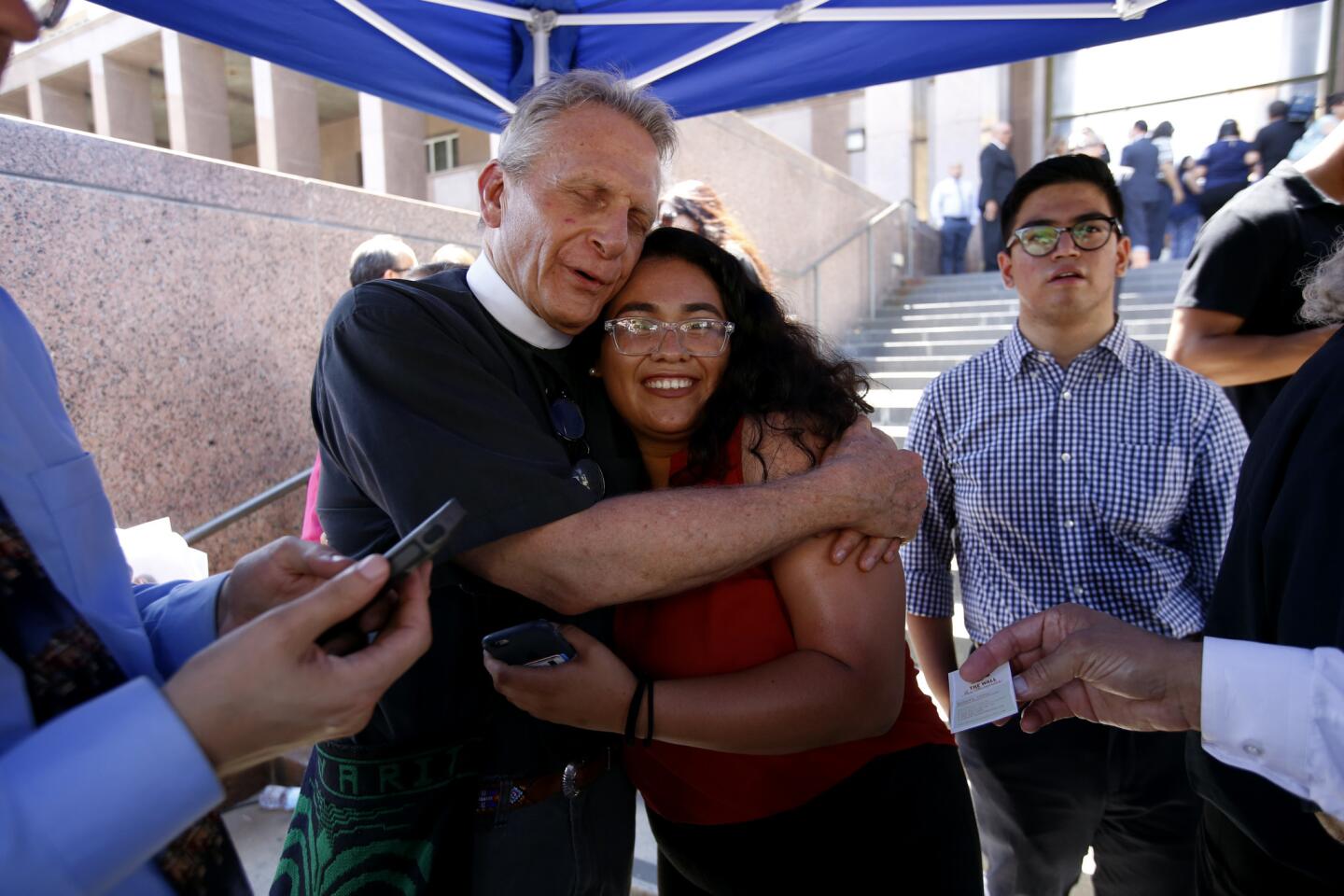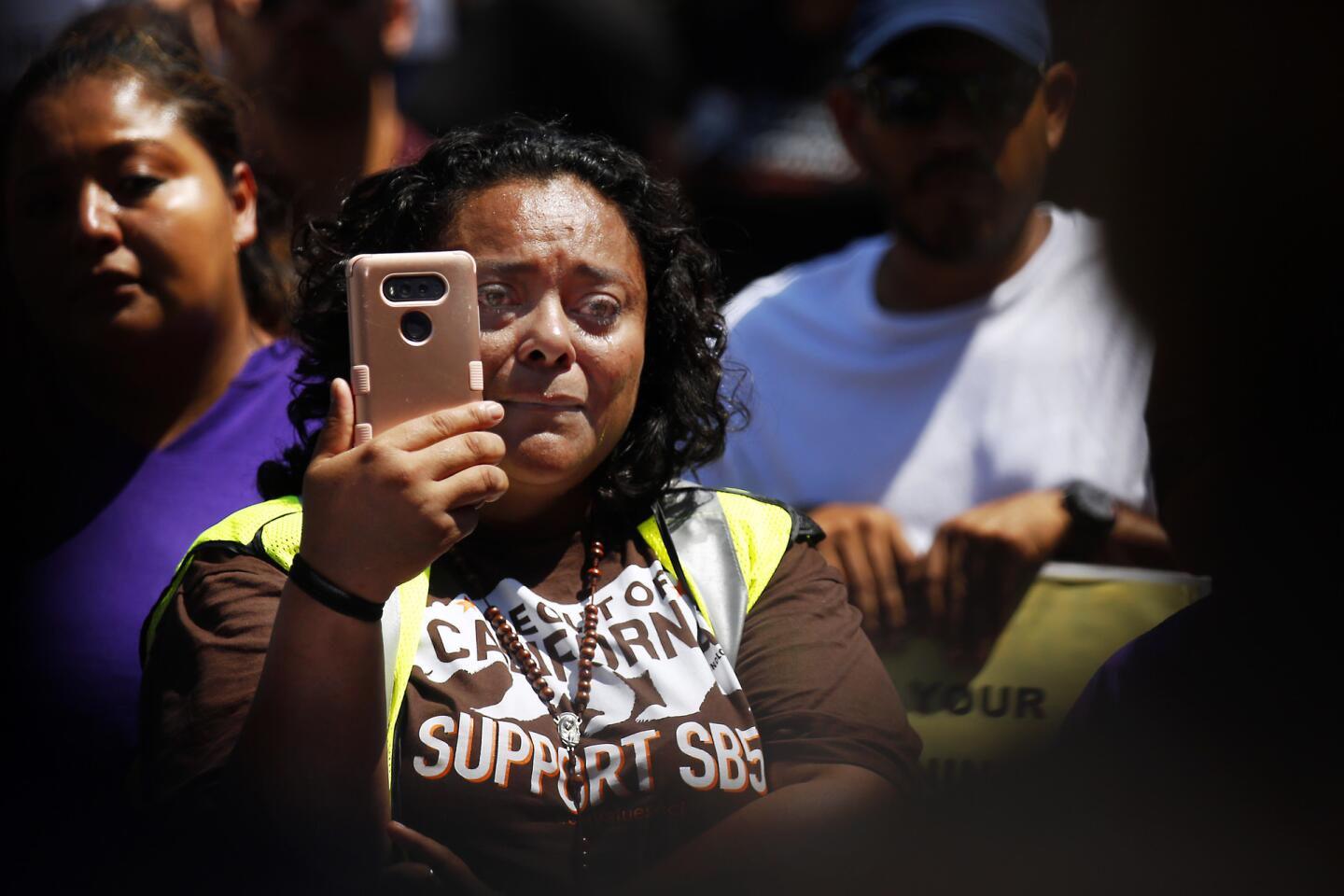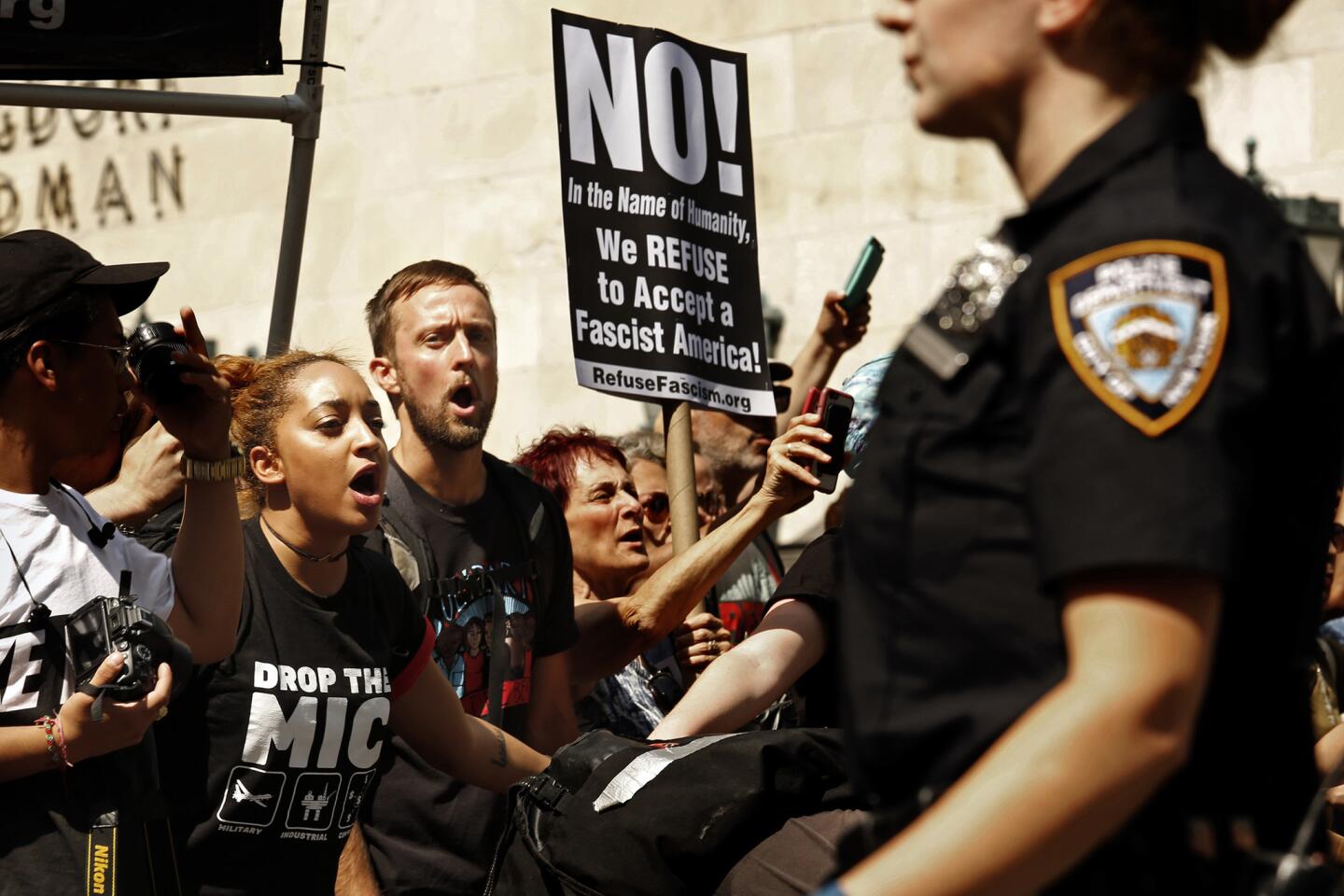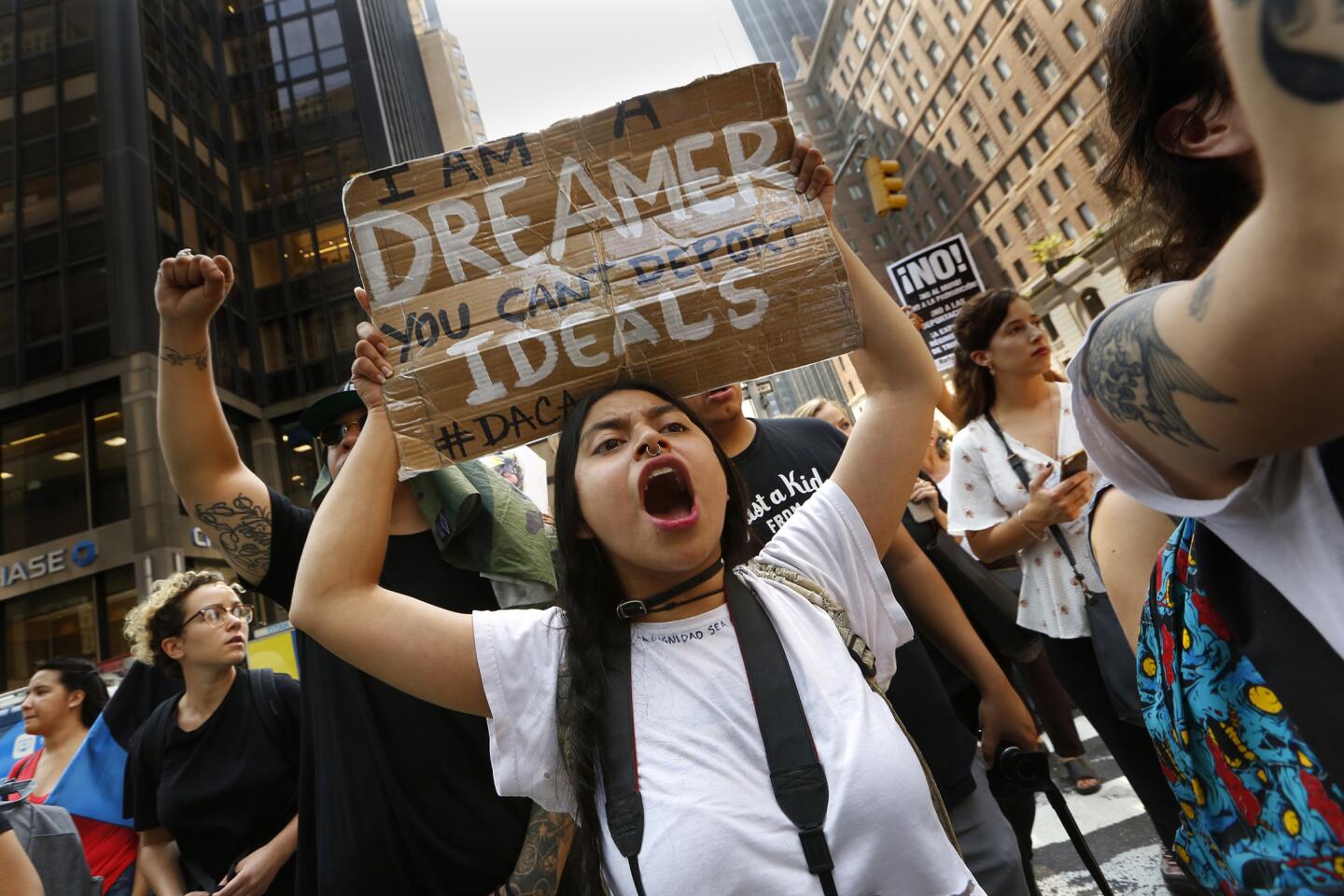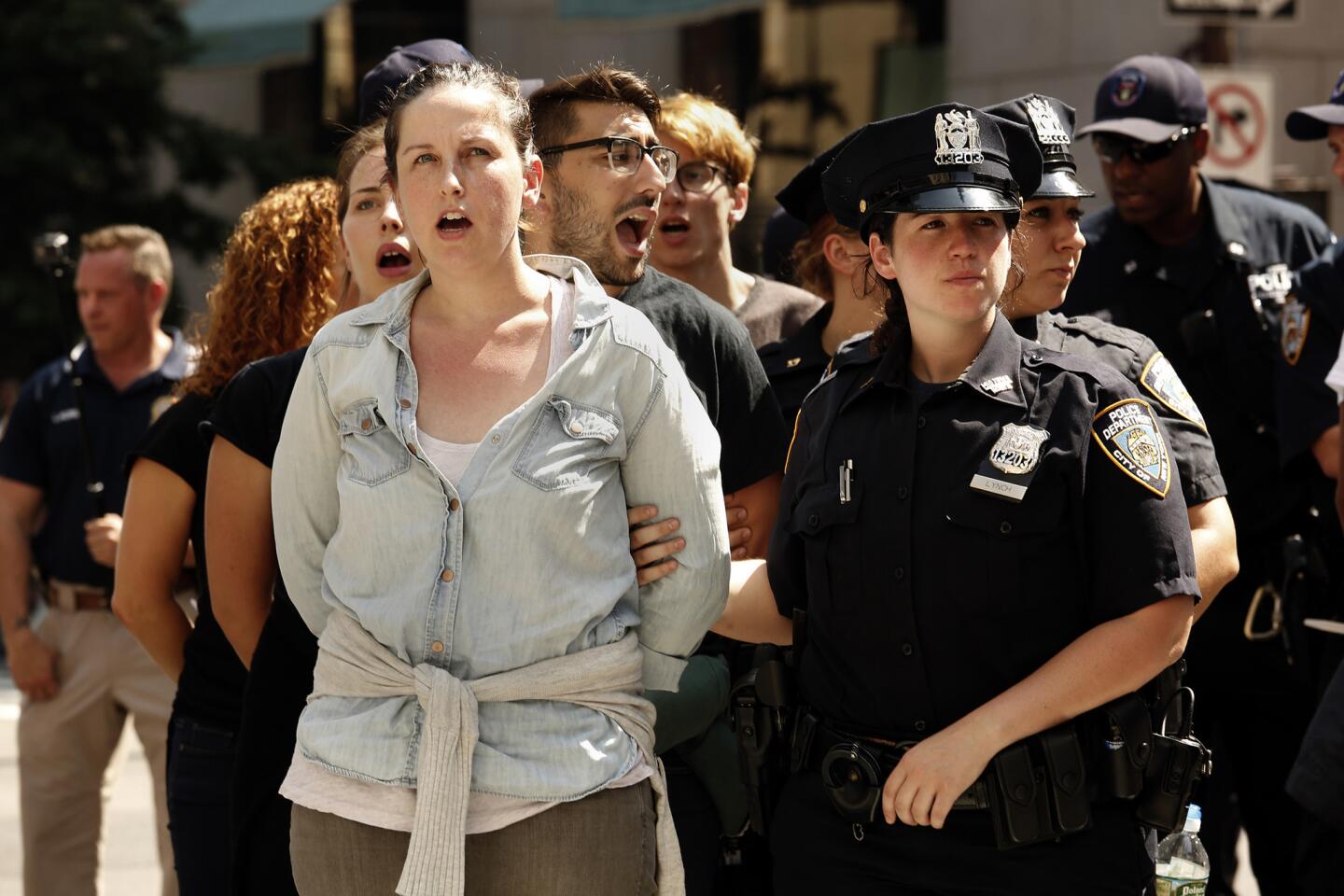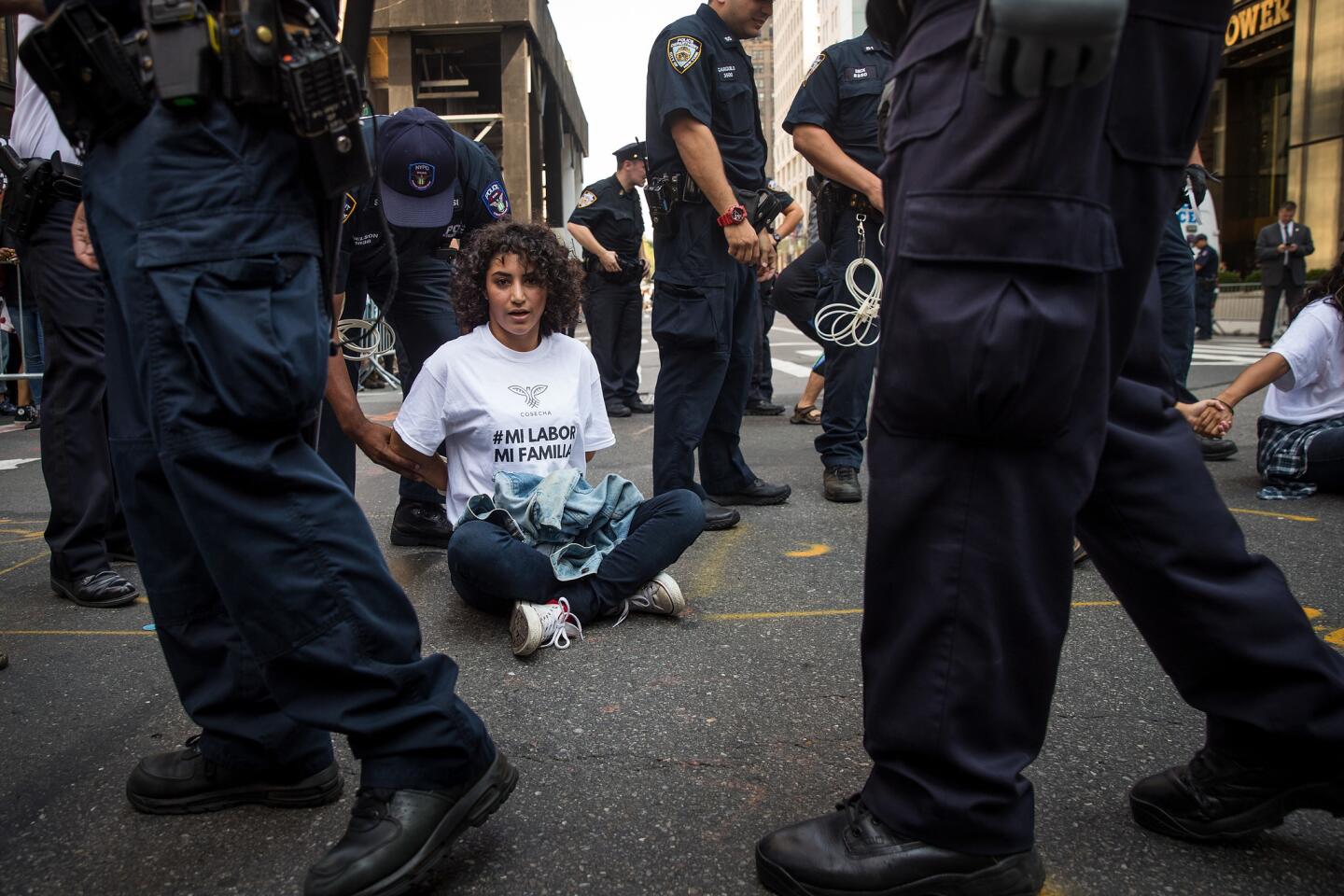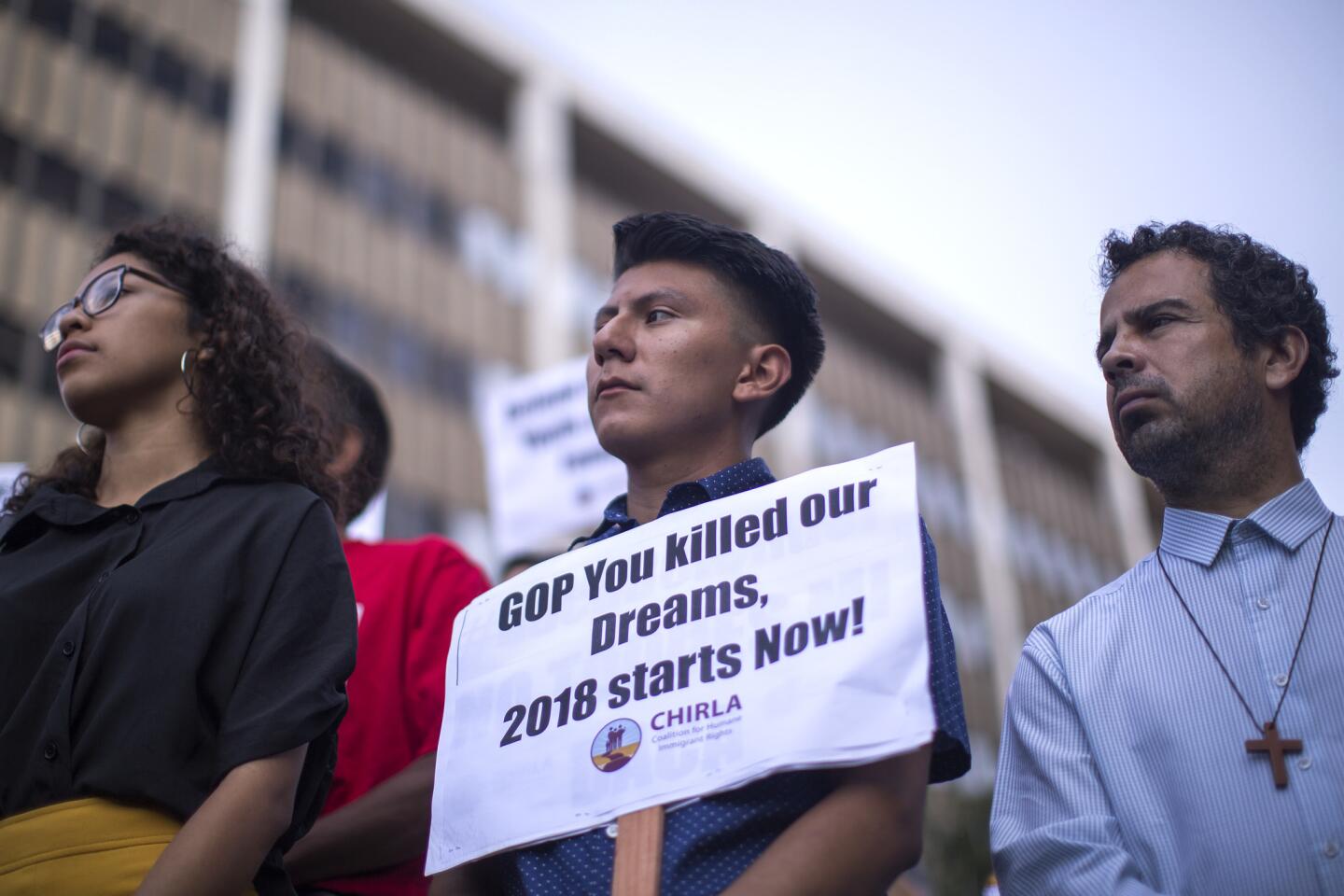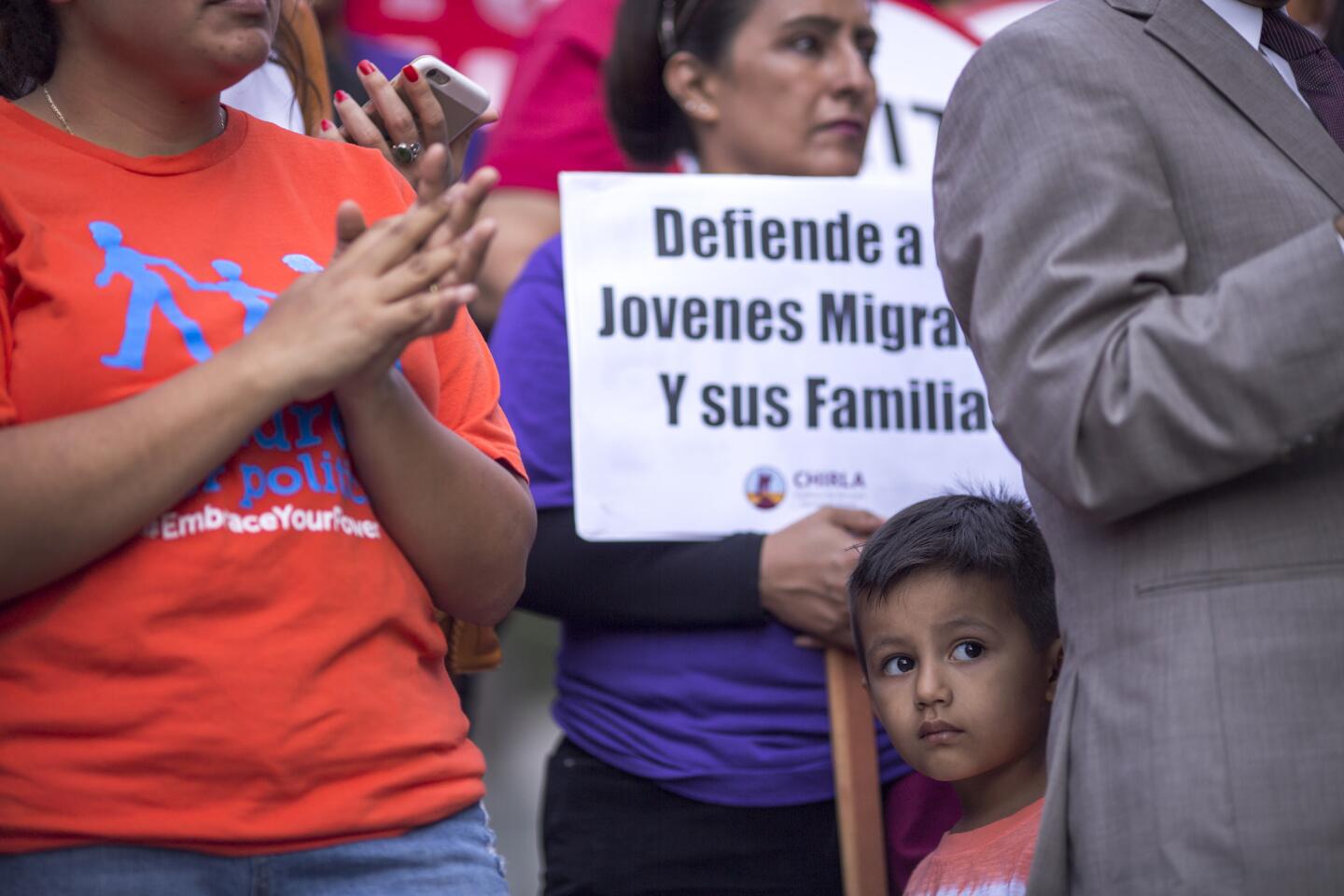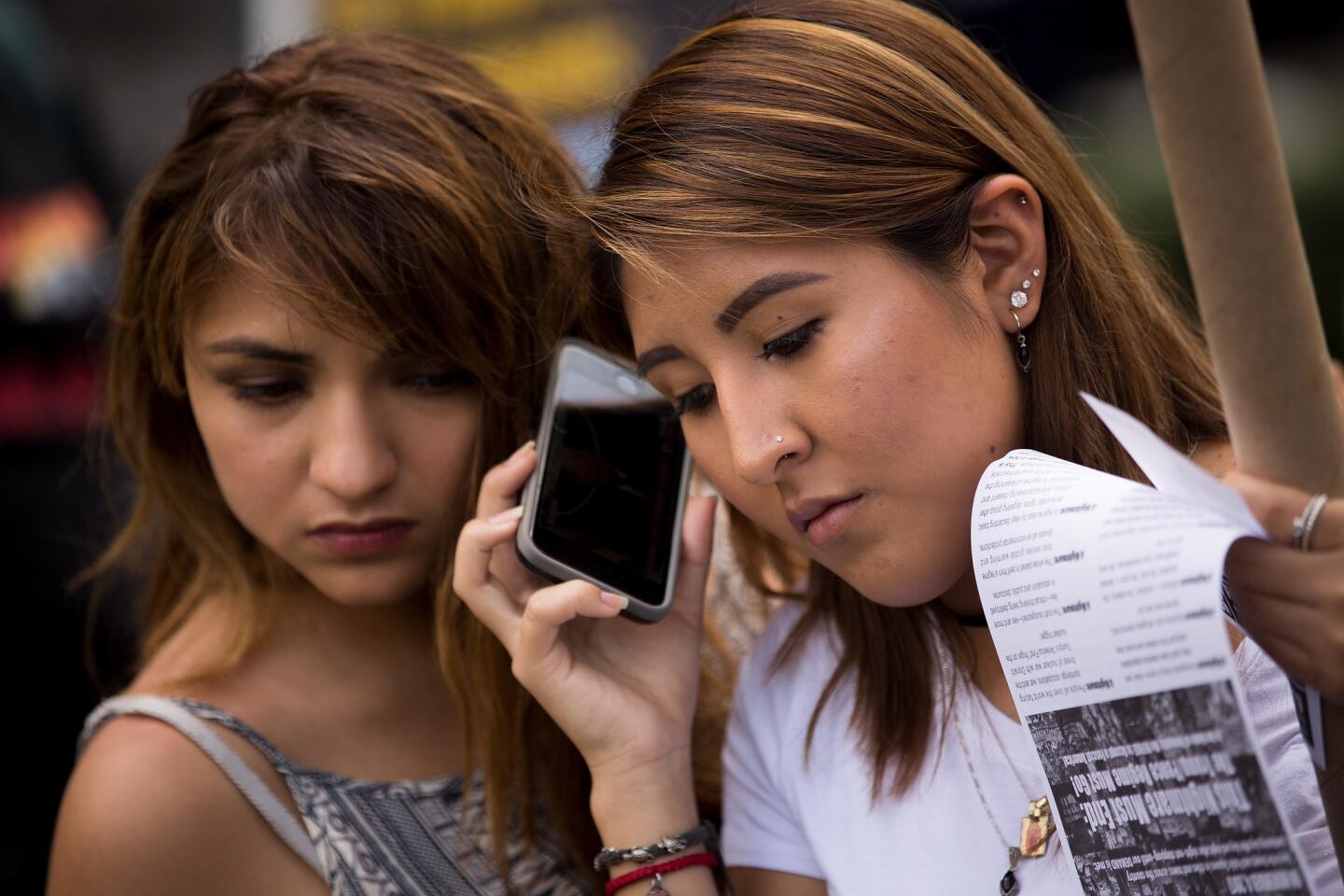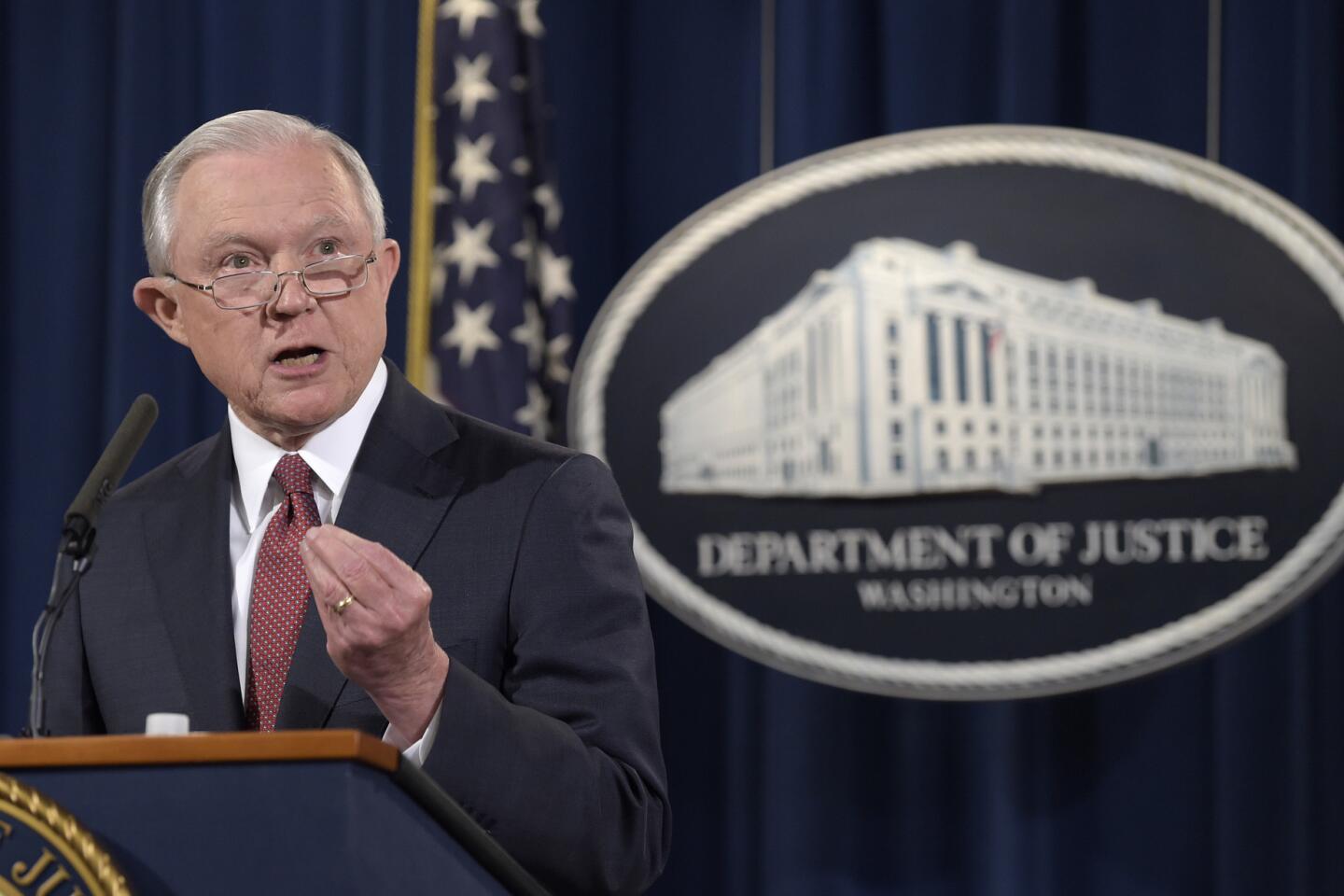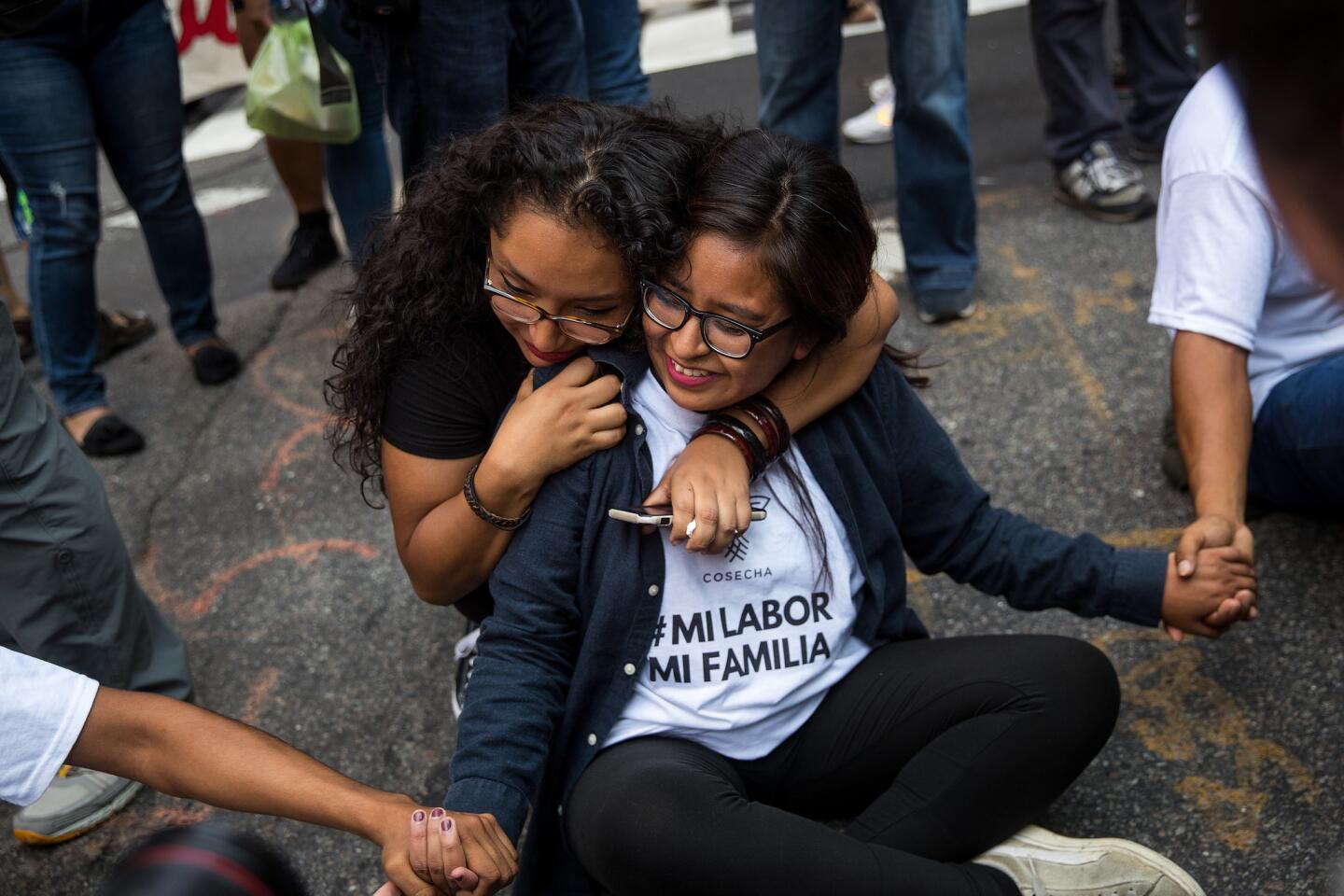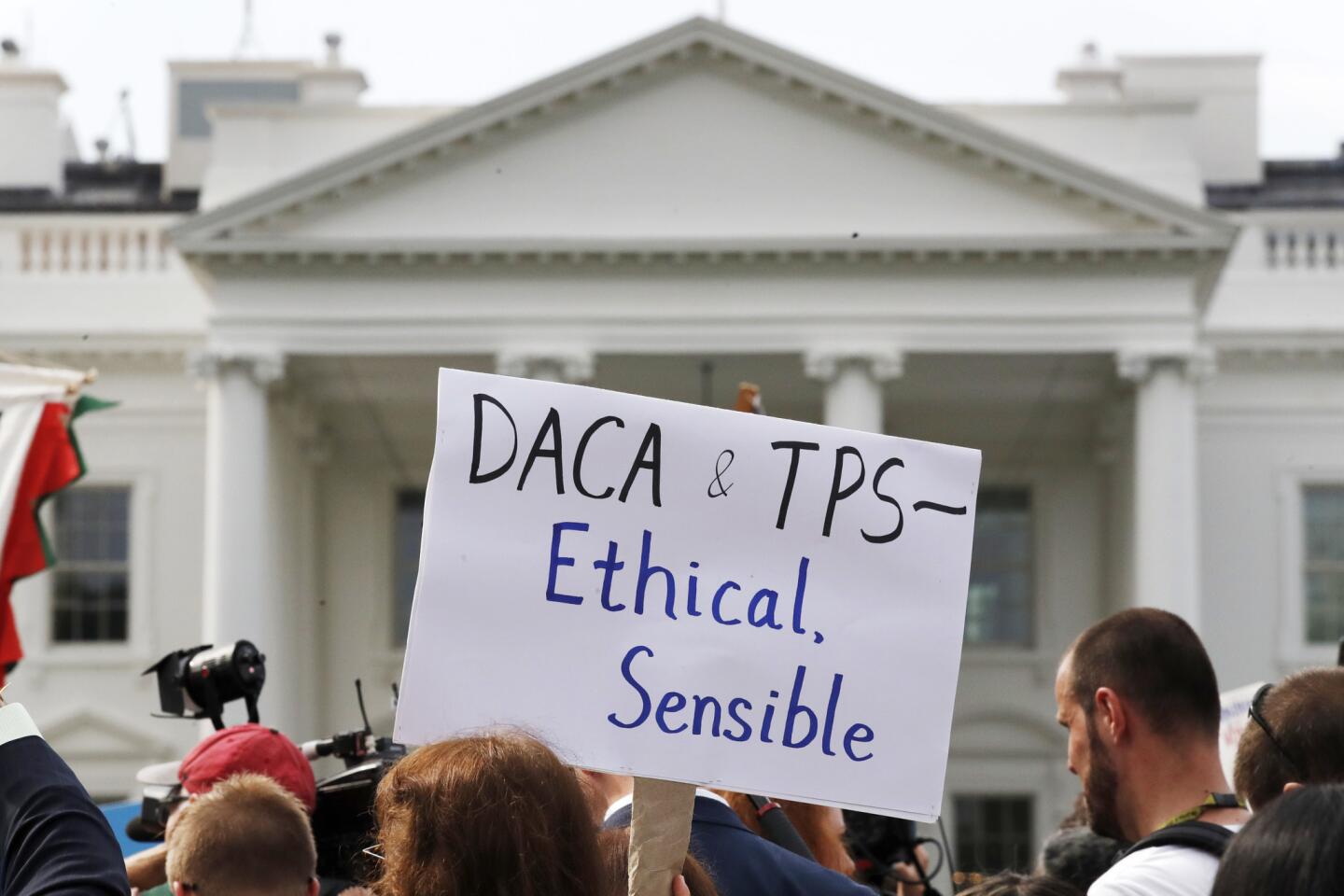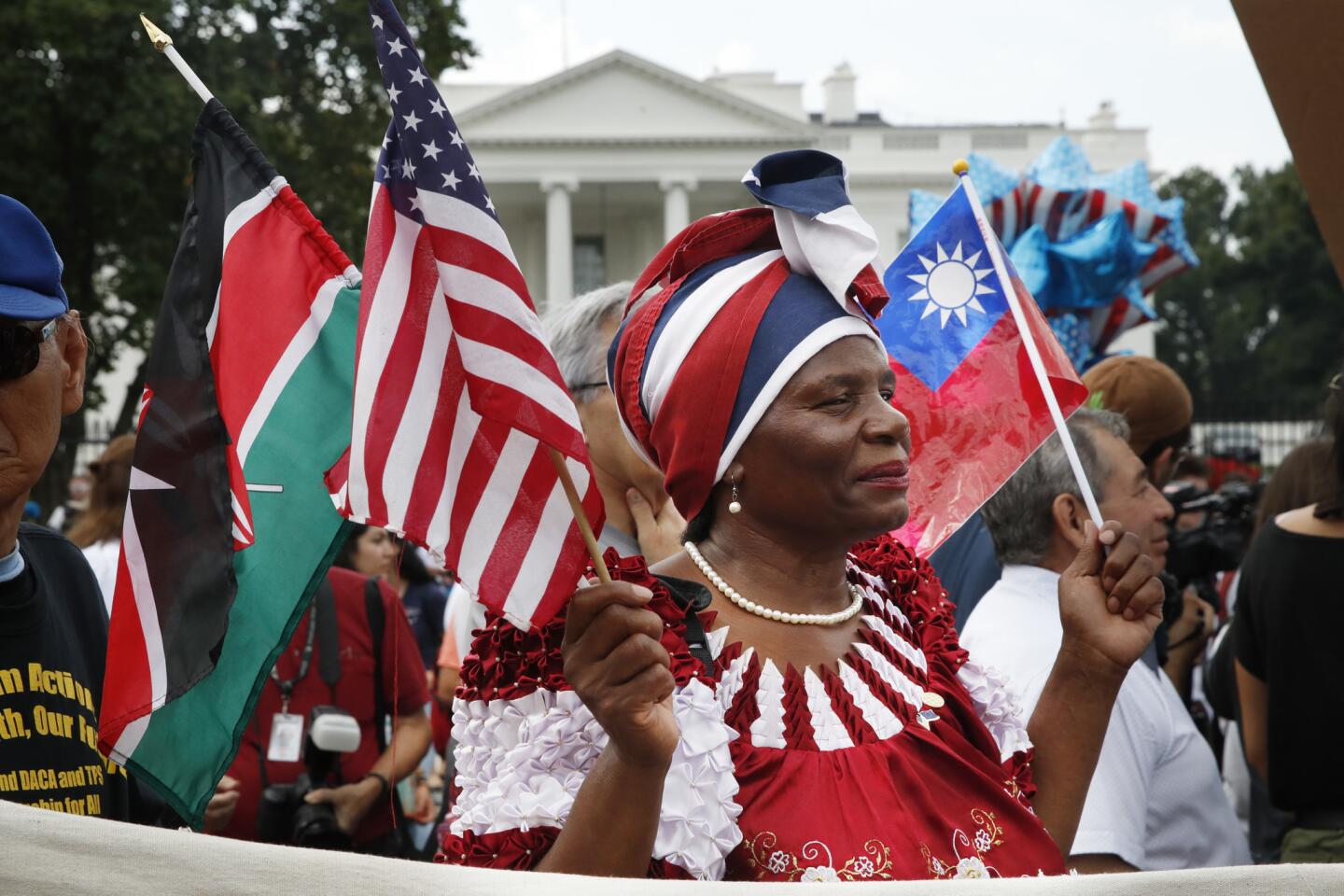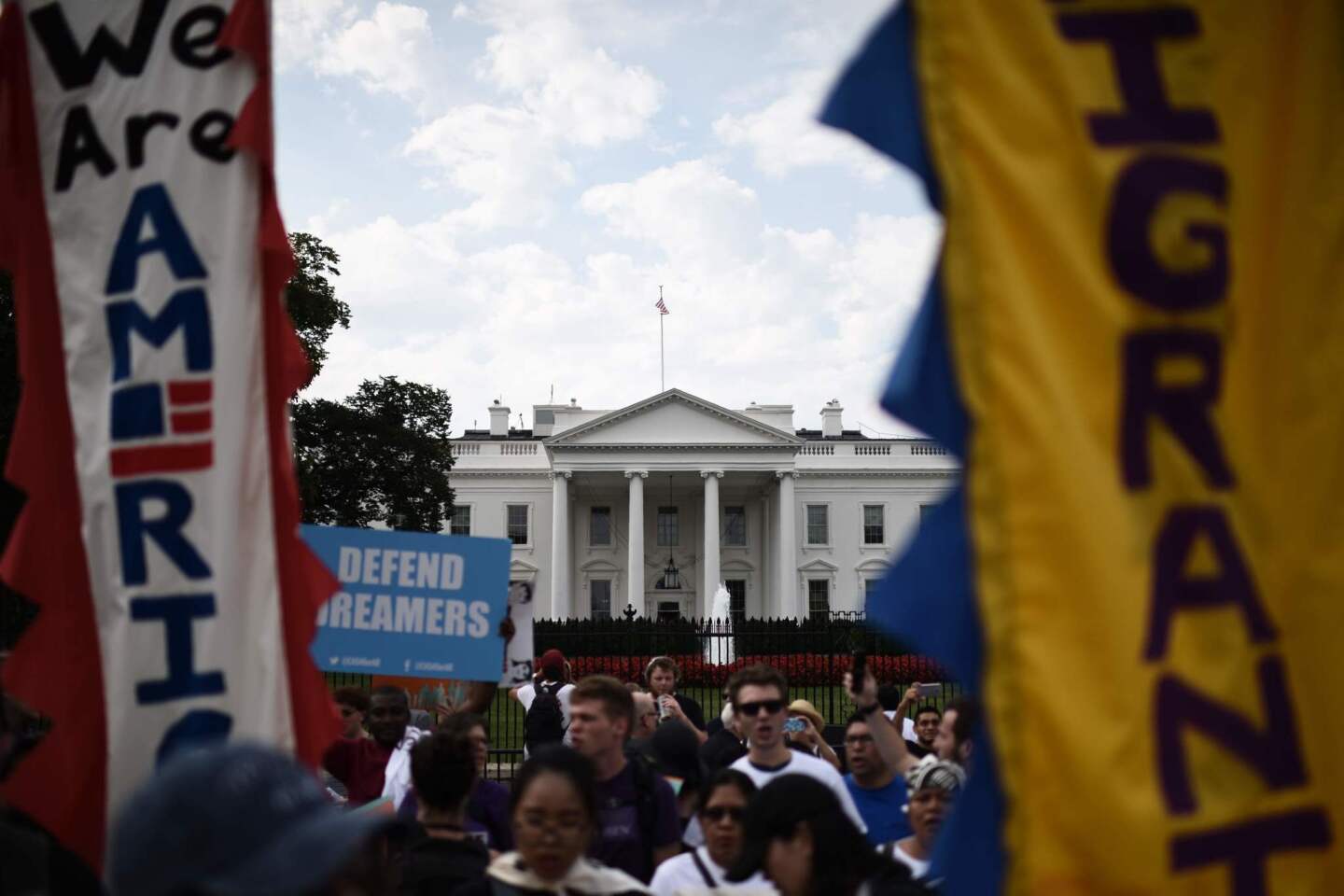Among ‘Dreamers,’ dismay and anger over Trump’s decision: ‘He just rips it all away’
Karla Estrada expected the news that the federal program that has shielded her from deportation to Mexico for much of her life was in danger. But hearing it still hurt.
The 26-year-old Los Angeles paralegal assistant, one of America’s 800,000-strong “Dreamers” in the Deferred Action for Childhood Arrivals program, came to the United States with her parents when she was 5. Her life has been here.
Now everything for which she’s worked so hard is in jeopardy.
“DACA gave me a taste of the American life,” she said Tuesday. “It was a Band-Aid … cruelly taken off.”
Fear, uncertainty and defiance greeted President Trump’s decision Tuesday to begin rescinding protections against deportation for people brought illegally to the United States as children, unless Congress steps in within six months.
As protests swiftly spread across the country, advocacy groups decried the decision as capricious and illogical, saying it targets the very immigrants who are most likely to make significant contributions to the U.S. economy and society.
Trump’s backers say he is acting in accordance with the law, and that President Obama overstepped his executive bounds when he created DACA five years ago.
Atty. Gen. Jeff Sessions, announcing the administration’s move, declared that the Obama-era policy had been “implemented unilaterally, to great controversy and legal concern.” With that, he ushered in a dread-filled legal limbo for DACA’s young recipients.
Jesus Perez wasn’t ready to accept it. While the Dreamers’ status will not be immediately affected, the Trump administration’s self-described “orderly wind-down” of the policy could eventually leave them vulnerable to either deportation or a return to an undocumented netherworld.
“To have your future being played with and tossed around like it’s a football — no!” said Perez, a 25-year-old research assistant at Johns Hopkins University in Baltimore who joined a crowd of protesters near the White House.
Perez came to the U.S. with his parents from Mexico when he was 5. He said he and other DACA participants were ready to “stand up and fight.”
So were others. Demonstrators, some waving banners or wiping tears, marched in cities including Denver, Phoenix and New York. Near glitzy Trump Tower in Manhattan, 34 protesters were arrested for sitting in the middle of Fifth Avenue and 57th Street, a busy intersection flanked by luxury stores.
“We never had hopes of anything better from Trump, since he ran a campaign based on hatred of immigrants,” said Gloria Mendoza, 26, an artist who moved to Texas as a child from Mexico and now lives in Brooklyn, N.Y. She carried a hand-lettered poster that said, “You can’t deport ideals.”
Word of Trump’s decision was a heavy blow to some who had already seen their lives blighted by disaster.

Atty. Gen. Jeff Sessions said that Obama’s action in creating the program was unconstitutional. (Sept. 5, 2017) (Sign up for our free video newsletter here http://bit.ly/2n6VKPR)
In hurricane-hammered east Houston, 27-year-old Dulce Puente, who moved from Mexico to Texas at 13 with her mother, was busy with repairs to the home she shares with her husband and two sons, ages 5 and 3. The house was flooded with 4 feet of water after Hurricane Harvey hit Texas on Aug. 25.
“We lost everything,” said Puente, a DACA participant who most recently renewed her status in July. Now, she said, “We are wondering what’s going to happen…. I’m scared.”
Elsewhere, some already saw a dreamed-of future slipping away. Rainy Leonor, 23, who arrived from the Dominican Republic as a 6-year-old, worried that her hopes of transferring to a four-year college after graduating from Reading Area Community College in Reading, Pa., would be dashed.
“I worked really hard to get where I am,” said Leonor, who traveled to Washington to protest the decision. “It’s not fair that he just rips it all away.”
Obama, DACA’s prime architect, had remained largely silent on his successor’s policies in the nearly eight months that Trump has been in office. But the administration’s decision to scrap a landmark legacy drew an unusual online rebuke from the former president.
“Ultimately, this is about basic decency,” Obama wrote in a statement posted on social media. “This is about whether we are a people who kick hopeful young strivers out of America, or whether we treat them the way we’d want our own kids to be treated. It’s about who we are as a people — and who we want to be.”
Among major U.S. cities, Los Angeles may have the deepest connections to the DACA program, shaped by immigration patterns, geography and history. Mayor Eric Garcetti called Trump’s decision a “giant setback for America, because all of our children should feel safe and accepted in a country that belongs to them.”
For Estrada, sadness quickly hardened into determination.
She won’t abandon her dream of law school, she said. And she won’t settle, she said, for “scraps.”
“I really hope that it’s going to be the beginning of something of a broader movement for our undocumented community to work together toward legislation,” she said. “Hopefully this fuels the fight.”
This generation of immigration activists presents a new dynamic, said Maria Brenes, executive director of the advocacy group InnerCity Struggle, based in Boyle Heights, east of downtown Los Angeles.
They’re afraid of what could happen to them and their families, she said, but determined to be heard.
“It’s a combination of that fear, but also that fearlessness,” she said. “Of wanting to stand up, of not wanting to be pushed into the shadows, of wanting to have their human dignity recognized.”
Major advocacy groups denounced the White House decision, which sets March 5 as the program’s end date unless Congress enacts a new version of it. Effective immediately, no new applications will be accepted, the White House said.
Richard Cohen, president of the Southern Poverty Law Center, called it “one of the most senseless, heartless, inhumane acts of any president in recent memory.”
Lorella Praeli, director of immigration policy and campaigns at the American Civil Liberties Union, said Trump’s action had “injected chaos and uncertainty into thousands of workplaces and communities across America.”
Many corporate executives, already backing away from Trump over his seeming equivocation over white supremacists’ responsibility for deadly violence in Charlottesville, Va., in July, recoiled at the DACA decision and expressed support for employees participating in the program.
Tim Cook of Apple, which employs more than 250 Dreamers in 28 states, voiced dismay over Trump’s decision in a letter to all the company’s workers. DACA recipients “may have been born in Canada or Mexico, Kenya or Mongolia, but America is the only home they’ve ever known,” the chief executive wrote.
Educators, pointing to the unprecedented opportunities afforded young immigrants by DACA, expressed support for their students who are now unsure they will be able to continue their college educations.
University of California President Janet Napolitano, who helped craft the original DACA provisions while serving as Obama’s Homeland Security secretary, said Trump’s action “threatens to separate families and derail the futures of some of this country’s brightest young minds.”
Like many other college administrators, she pledged that DACA enrollees would be able to continue to receive existing support and benefits pending any congressional action, such as paying in-state tuition.
Near the White House, marcher Norma Gutierrez Morelos, who was brought from Mexico to Ohio as a 10-year-old, said she still believed DACA represented the values of a nation she had embraced.
Gutierrez Morelos, 24, who is studying at Lake Erie College in Painesville, Ohio, wants to become a teacher. She thinks her background will allow her to help students of different cultures, as well as their parents, to navigate life in the United States, just as she has.
“We want legislation for Dreamers,” she said. “Part of me feels that if we keep fighting, something has to happen.”
Staff writer King reported from Washington and Carcamo from Los Angeles. Times staff writers Barbara Demick contributed to this report from New York, Molly Hennessy-Fiske from Houston, Sonali Kohli from Los Angeles, and special correspondent Lauren Rosenblatt from Washington.
UPDATES:
5:50 p.m.: The article was updated with additional quotes from people enrolled in DACA.
2:20 p.m.: The article was updated with reaction from a Houston flood victim who is enrolled in DACA.
1:05 p.m.: The article was updated with additional details and reactions, including comments by former President Obama and Los Angeles Mayor Eric Garcetti.
The article was originally published at 11:20 a.m.
More to Read
Sign up for Essential California
The most important California stories and recommendations in your inbox every morning.
You may occasionally receive promotional content from the Los Angeles Times.
